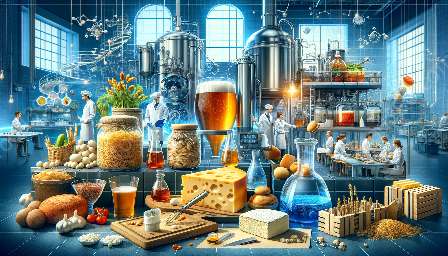Fermentation plays a vital role in the biotechnological applications within the food and drink industry, affecting the production of diverse products through the application of fermentation science.
Fermentation Science and Its Impact
Fermentation science involves the use of microorganisms to bring about chemical changes in organic substrates. It has numerous applications in food and drink, leveraging the metabolic activities of microorganisms for beneficial purposes. These applications are widely recognized for their biotechnological significance.
Food and Beverage Fermentation
One of the key areas where fermentation is applied biotechnologically is in food and beverage production. Various food items and drinks are generated through fermentation, enriching them with unique flavors and textures.
- Yogurt and Fermented Dairy Products: Fermentation is employed in the production of yogurt, cheese, and other dairy products. Bacteria cultures like Lactobacillus and Streptococcus are used to ferment milk, producing products with enhanced nutritional value and unique taste.
- Bread and Bakery Products: Yeast fermentation is essential for leavening bread and producing baked goods. The carbon dioxide gas produced during yeast fermentation causes bread to rise, resulting in its characteristic light and airy texture.
- Alcoholic Beverages: Fermentation is a critical step in the production of alcoholic beverages such as beer, wine, and spirits. Yeast converts the sugars in fruits, grains, or other fermentable substances into alcohol and carbon dioxide, giving these beverages their alcoholic content and distinctive flavors.
- Fermented Condiments and Sauces: Fermentation is used in the production of condiments like soy sauce, miso, and vinegar. Microorganisms like Aspergillus and lactic acid bacteria are employed to ferment soybeans, rice, or grains, resulting in the characteristic flavors and nutritional benefits of these products.
Biotechnological Advancements in Fermentation
Advancements in biotechnology have led to innovative applications of fermentation in the food and drink industry, enhancing product quality and nutritional value. The development of specialized fermentation processes and the use of genetically modified microorganisms have further expanded the biotechnological impact of fermentation.
Probiotics and Functional Foods
Fermentation is utilized to produce probiotics and functional foods, catering to the growing demand for products that promote digestive health and overall well-being. Probiotic-rich foods such as kefir, kombucha, and fermented vegetables provide beneficial bacteria that aid in maintaining a healthy gut microbiota.
Biopreservation and Food Safety
Fermentation has biopreservation effects, where the growth of harmful microorganisms is inhibited, contributing to food safety and shelf-life extension. The production of fermented foods with natural antimicrobial properties helps minimize the need for synthetic preservatives and additives, aligning with consumer preferences for clean-label products.
Waste Reduction and Sustainable Practices
Biotechnological applications of fermentation have also contributed to sustainable practices within the food and drink industry. By utilizing fermentable waste streams such as fruit peels, vegetable trimmings, and by-products from food processing, fermentation processes can convert these materials into value-added products, reducing waste and promoting environmental conservation.
Future Perspectives and Innovations
The ongoing research and development in fermentation science are paving the way for exciting future innovations in biotechnological applications. Novel fermentation techniques, the use of alternative substrates, and the exploration of microbial diversity hold promising prospects for the continued evolution of fermentation technology in the food and drink sector.
Microbial Bioprospecting
Scientists are engaged in the exploration of diverse microbial strains with distinctive metabolic capabilities for potential biotechnological applications. This includes the discovery of novel fermentative microorganisms capable of producing unique flavors, aromas, and bioactive compounds, expanding the range of fermented food and beverage products available to consumers.
Precision Fermentation and Automation
The integration of precision fermentation technologies and automation systems is expected to streamline and optimize fermentation processes. This may lead to the development of customized fermentation solutions that can cater to specific product characteristics, ensuring consistent quality and improved production efficiency.
Biotechnology-Informed Fermentation
The convergence of biotechnology and fermentation is driving the development of tailored fermentation strategies, informed by genetic engineering, synthetic biology, and computational tools. These advancements hold the potential to create designer microbes and optimize fermentation pathways, enabling the production of innovative food and drink offerings with enhanced nutritional profiles and sensory attributes.

